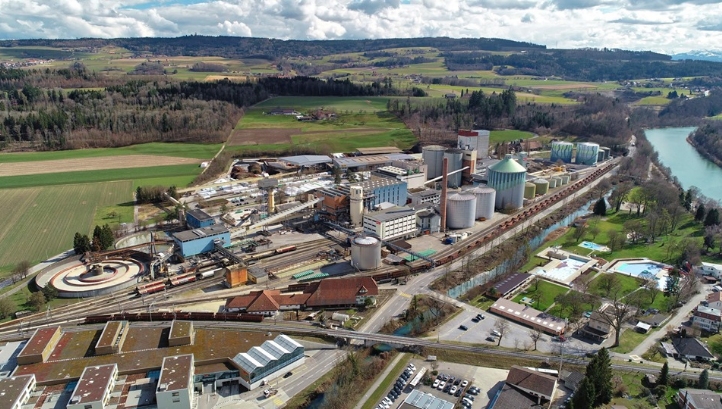European business majors have been ranked among the most ambitious when it comes to tackling climate challenges – and the most prepared for adapting to the risks global warming poses – in a new report by KPMG.

Switzerland topped the league table for sustainable business. Pictured: Schweizer Zucker’s Aarberg sugar factory
The professional services giant’s Change Readiness Index, published late last week, ranks 140 nations on how effectively their policymakers and business communities prepare for, and respond to, major changes – from digitisation, to conflict and global warming.
It ranks business action on rapid change based on a metric it dubs ‘Enterprise Sustainability’, which takes into account factors such as carbon emissions per unit of GDP and the energy mix used by the business community.
The ranking places Switzerland first overall, and in terms of Enterprise Sustainability, for the second consecutive year. It states that the country is “punching above its weight”, having scored 16% better than initially predicted.
The rest of the top five nations for Enterprise Sustainability are Singapore, Denmark, Hong Kong and the United Arab Emirates (UAE). The UK comes in at sixth, up two places on last year’s Index, and the top ten is rounded off by Germany, Sweden, the Netherlands and New Zealand.
According to the Index, businesses headquartered within the EU perform “above the global average in environmental sustainability compared to other regions”, bolstered by strong policy support for doing so.
But it also notes that the European countries which are leading the way in terms of Enterprise Sustainability – and have been since 2017 – are largely not naturally rich in resources. Indeed, the best performing nation which is considered naturally resource-rich, Norway, only made 32nd place, while Russia ranked in the bottom five overall.
KPMG states that this trend indicates that the private sector in resource-rich areas should now do more to diversify their national economies, divesting from high-carbon assets and those which cause deforestation and environmental degradation. This move, it claims, could spur policymakers to follow suit and set stronger legislation around preparing for change.
“Our research highlights that too many nations can be reliant on either business, government or civil society to shoulder the responsibility for change readiness – but in our experience, this doesn’t yield the best long term results,” KPMG’s global chair of international development assistance services Timothy Stiles said.
“True preparedness is when each segment of society – enterprise, government, and people and civil society – works in harmony toward a shared outcome.”
The winds of change
The report from KPMG comes shortly after CDP concluded that 215 of the largest companies in the world risk collectively losing up to $1trn to climate impacts, with most of this risk set to hit within the next five years.
According to the organisation’s latest analysis, this coalition of firms has predicted that it will lose $250bn due to the write-off of stranded assets in the coming years, due largely to the declining profitability of high-carbon facilities and the physical impacts of rising temperatures.
However, these companies also collectively estimated that switching to low-carbon products, services and business models would generate $2.1trn of additional revenue within the next five years, compared to an initial outlay of $311bn. More broadly, it has been estimated that $12trn could be added to the global economy per year by 2030, if the global business community delivers on the aims of the UN’s Sustainable Development Goals (SDGs).
Sarah George
